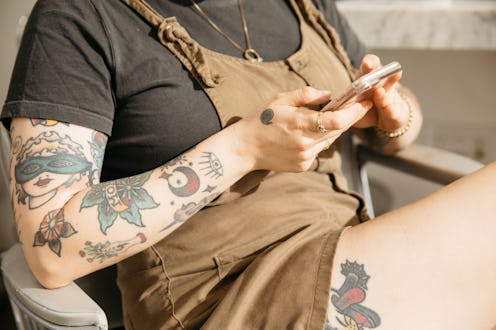Life
This Chat Bot Helps Refugees Connect With Translators — Over Facebook

There’s no question that living as a refugee in the United States, or anywhere in the world, can be challenging. Over the past few years, global human displacement has been labelled the "worst refugee crisis since WWII," as xenophobic policies further challenges people's ability to live freely across the world. Amid these difficulties, one nonprofit organization is trying to improve the quality of life for refugees by solving any language barriers between refugees and aid workers: Tarjimly is a nonprofit organization that aids refugees, immigrants, and aid workers by connecting them with translators from anywhere in the world — through Facebook's Messenger app.
“Tarjimly was born [in spring 2017], when Trump’s travel ban affected the co-founders’ families and friends,” Uzma Saeed, the Head of Engagement and Communications for Tarjimly, tells Bustle via email. “The Tarjimly team is entirely [composed of] Muslim American millennials, and when they saw urgent calls on social media for translators at airports, they announced the creation of the nonprofit.” The chat bot, which is available through Messenger, connects refugees and aid workers to translators who can help bridge the language barriers between refugees and volunteers at refugee camps.
The chat bot is largely reliant on large base of volunteers who serve as translators for refugees, as well as aid workers and refugee camp volunteers. Tarjimly has over 2,500 volunteer translators who can speak various languages. As of now, Tarjimly is available in sixteen languages — including Arabic, Spanish, and Bengali. Saeed tells Bustle that Tarjimly is currently in need of Burmese, Kurdish, Pashto, and Somali translators, but encourages people who speak any of the languages offered to sign up as a translator.
Saeed says translators on Tarjimly have aided over 1,000 refugees and aid workers in the past nine months. According to Tarjimly’s site, many of the translation topics center around basic needs; topping the list are legal or asylum concerns, medical care, education, counseling services, daily requests at refugee camps, and employment. The service is powerful tool that has helped refugees stuck in dire situations without in-person translator.
“One of the stories that has stayed with me is of an English-speaking counselor who was running a women's center in Lesvos [Greece.] It was a busy night, and one of the Arabic-speaking refugees was very distraught,” says Saeed. “There were no translators on-site for the counselor to utilize, so she tried Tarjimly. She was connected to a translator within seconds, and the translator explained that the refugee needed to see an OB-GYN, and required medical attention. This is why the co-founders started Tarjimly — to overcome language barriers in time-sensitive situations.”
Getting involved with Tarjimly and becoming a volunteer translator is pretty straightforward: There is no signup required, and no wait time to utilize the service. All you have to do is ping Tarjimly on Messenger, let them know you are a translator, and you will be asked a couple questions to gauge your language skills. “There's no minimum fluency requirement. We ask translators if they speak the language natively, if they're proficient, or if they're conversational,” says Saeed. “We also ask if they can read, type, and/or speak the language, and what times they are generally available to translate. When there is a translation request, we take that info into account before matching someone to a refugee or aid worker.”
In addition to regular translating services, the nonprofit hopes to get more translators with medical or legal experience on board. “As our community grows, we will be able to match refugees and aid workers to translators based on specialized [medical or legal] knowledge. This isn't necessarily so refugees can receive legal advice or medical advice on Tarjimly. It's because some terminology is nuanced or hard for the average speaker to understand,” explains Saeed. “For instance, I speak Urdu proficiently, but I still struggle translating words like ‘paralysis’ or ‘gingivitis.’ These types of requests are rare currently, but if they become common asks, then we will start matching translators accordingly.”
Currently, Tarjimly is only accessible through the Facebook Messenger app, but Uzma says the creators “chose the Messenger chatbot platform because it allows for easy registration, intelligent routing and matching, anonymity, and support for all languages.” Saeed adds that while she volunteered at a refugee camp in Greece two years ago, she found both the refugees and camp volunteers mainly used Messenger to keep in contact with family members, as well as other refugee camps. However, Tarjimly is working on expanding to a standalone app that allows multi-platform chats with different apps including Messenger and WhatsApp.
In today’s world, creating a network to support and aid immigrants and refugees, as well as volunteers, is crucial. Being displaced to a new country is difficult enough, and language barriers can make this transition even harder. Having translators available to help refugees may seem small, but having easily accessible translation services — like Tarjimly provides — can literally save lives.